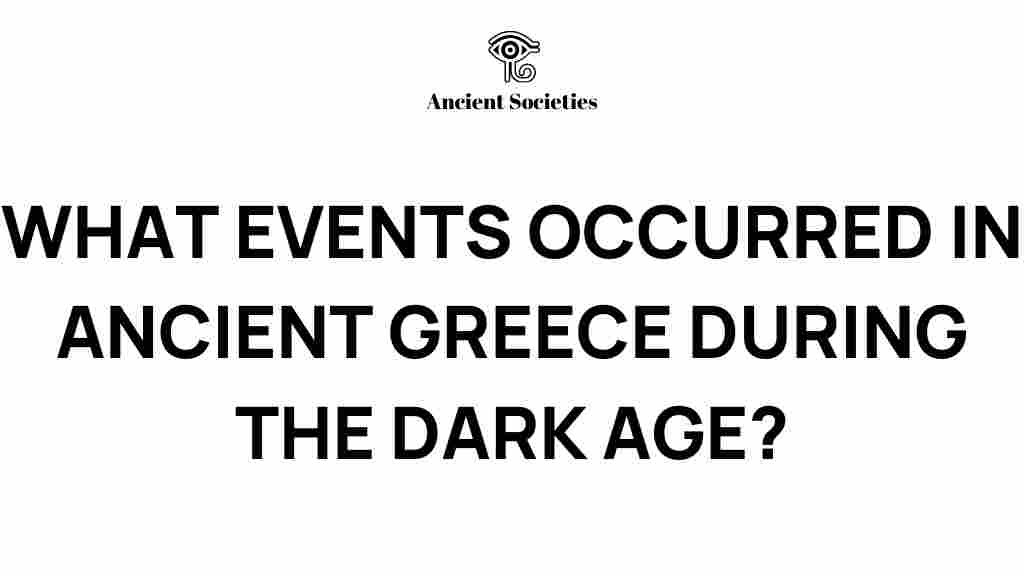Unraveling the Mysteries of Ancient Greece’s Dark Age
The history of Ancient Greece is a tapestry woven with threads of culture, mythology, and societal change. However, one of the most enigmatic periods in this ancient civilization is the Dark Age, which followed the collapse of the Mycenaean civilization around 1100 BCE. This era, often characterized by a decline in population, literacy, and cultural achievements, remains shrouded in mystery. Through archaeology and historical analysis, we can begin to understand the implications of the Dark Age on Greek history and its lasting legacy.
The Transition from the Mycenaean Era to the Dark Age
The Mycenaean civilization was a dominant force in the Aegean world, known for its impressive palaces, advanced infrastructure, and rich artistic achievements. However, the fall of this civilization marked the onset of the Dark Age, a period that lasted roughly from 1100 to 800 BCE. This transition was not sudden; rather, it was a complex process influenced by various factors:
- Invasions and Warfare: The arrival of the Dorians and other groups contributed to the destabilization of the region.
- Natural Disasters: Earthquakes and droughts may have played a role in the decline of agricultural productivity.
- Trade Disruption: The collapse of trade networks led to economic hardships and societal upheaval.
As a result, the population of Greece decreased significantly, leading to the abandonment of many towns and the deterioration of complex political structures.
Archaeological Insights into the Dark Age
Archaeology plays a crucial role in uncovering the truth about Ancient Greece’s Dark Age. Excavations at sites like Lefkandi, Nichoria, and the ancient city of Pylos have revealed valuable insights into this period:
- Material Culture: Artifacts such as pottery, tools, and remnants of buildings offer glimpses into daily life and survival strategies.
- Burial Practices: Changes in funerary customs indicate shifts in social organization and belief systems.
- Settlement Patterns: The emergence of small villages suggests a return to localized economies and communal living.
These findings challenge the notion that the Dark Age was a period of complete cultural stagnation. Instead, they suggest that while the complexity of Mycenaean civilization waned, new forms of social organization and culture began to emerge.
Cultural Developments During the Dark Age
Despite the challenges faced during the Dark Age, significant cultural developments occurred. One of the most notable aspects was the preservation and evolution of Greek mythology:
- Oral Traditions: The storytelling traditions that emerged during this time laid the groundwork for later epic poetry, including the works of Homer.
- Religious Practices: The worship of gods and goddesses continued, albeit in more localized forms, which contributed to the diversity of Greek religious practices.
- Artistic Expression: Simpler forms of pottery and sculpture emerged, reflecting the changing societal values and aesthetics.
These cultural adaptations would later influence the classical period of Ancient Greece, highlighting the resilience of Greek civilization.
Societal Change and the Rise of the Polis
As the Dark Age progressed, the foundations for the rise of the city-state, or polis, began to take shape. This transformation marked a significant shift in the political landscape of Ancient Greece:
- Decentralization: The collapse of Mycenaean palace systems led to a more decentralized form of governance.
- Community Focus: The emergence of small, self-governing communities fostered a sense of local identity and civic engagement.
- Political Innovations: New forms of political organization, including assemblies and councils, began to develop.
This period of societal change set the stage for the flourishing of Greek democracy in the classical era, demonstrating the adaptability of the Greek people in the face of adversity.
Mythology and Its Role in Greek Culture
Mythology served as a crucial component of Ancient Greek culture during the Dark Age. The stories of gods, heroes, and mythical creatures provided not only entertainment but also a means of understanding the world:
- Identity Formation: Myths helped to forge a shared identity among the diverse peoples of Greece.
- Moral Lessons: Many myths conveyed moral and ethical lessons, serving as a guide for behavior and societal norms.
- Cultural Continuity: The preservation of myths through oral tradition ensured that cultural knowledge was passed down through generations.
The impact of mythology extended beyond the Dark Age, influencing literature, art, and philosophy throughout the entirety of Ancient Greek civilization.
The Greek Legacy: Lessons from the Dark Age
The Dark Age of Ancient Greece, often viewed as a time of regression, actually laid the groundwork for the remarkable achievements of the classical period. The lessons learned during this time continue to resonate in modern society:
- Resilience: The ability to adapt and rebuild in the face of challenges is a testament to the strength of the human spirit.
- Value of Community: The importance of community and local governance remains relevant in contemporary political discourse.
- Cultural Heritage: The preservation of cultural narratives through mythology underscores the significance of storytelling in shaping identity.
The legacy of Ancient Greece, rooted deeply in its history, culture, and mythology, remains a touchstone for understanding human civilization.
Conclusion
The Dark Age of Ancient Greece represents a complex and often misunderstood chapter in the history of this remarkable civilization. Through archaeological discoveries and cultural analysis, we can appreciate the resilience and adaptability of the Greek people during a time of upheaval. The societal changes, cultural developments, and the enduring power of mythology that emerged from this period laid the foundation for the classical achievements that followed.
Understanding the Dark Age enriches our comprehension of Ancient Greece as a whole and highlights the importance of continuity and change in the evolution of civilizations. The Greek legacy, intertwined with its mythology and cultural practices, continues to inspire and inform contemporary society.
For those interested in exploring more about the fascinating history of Ancient Greece, visit this resource for in-depth articles and analyses. You can also check out archaeological findings related to the Dark Age through this external link.
This article is in the category History and created by AncientSocieties Team
